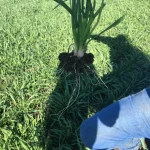Seeing healthy growing plants with shiny leaves and green ends for some gardeners is like a dream, or they’re left wondering if they’re real. Such plants are growing as a result of the right mix of nutrients naturally supplied to plants, healthy soil and protection from harmful elements and pests. These days the agriculture sector has increased their knowledge, expertise and application of fertilisers, particularly organic fertilisers which are gaining in popularity. Now, let’s see how we can pass this on to help you select the right fertiliser for your veggie patch.
Why Choose Organic Fertilisers?
What is Worm Compost Fertiliser
Nicknamed vermicompost, worm compost is a fertiliser made by earthworms breaking down organic matter. Packed with nutrients and beneficial microbes, it improves soil aeration and nutrient uptake by plants, while also boosting microbial activity and plant resistance to pests and diseases.
Benefits
1. Environmental Sustainability:
Organic plant fertiliser is a sustainable option for making your soil fit to support plant growth. There are natural compounds present in it, which means they don’t harm the environment and are eco-friendly. When opting for this fertiliser, you indirectly contribute to reducing soil pollution while also enhancing sustainable gardening practices.
2. Soil Health:
Fertilisers are not only important for plant growth but also for soil. Organically produced fertilisers improve soil health by making it rich in nutrients, additionally fertiliser like worm compost even goes further to improve the soil structure.
3. Safe for plants and animals:
Are you concerned about the safety of the plants and animals around it? When you start using organic vegetable fertiliser, you are making sure that no harmful chemical reaches the soil. This considerable absence of unnatural compounds and the presence of eco-friendly compounds makes the soil safe for plant growth and your pets and other animals if they eat it.
Assessing Your Soil’s Needs
Conduct a Soil Test
Before investing in any kind of organic vegetable fertiliser, you need to understand what kind of soil you are dealing with. Different soils have different needs which can be determined by conducting soil tests. It will provide you with valuable information, including soil pH level, nutrient content, salinity and more.
Steps for Conducting a Soil Test:
- Collect soil samples from different areas of your veggie patch.
- Mix the samples to get a composite sample.
- Commercial growers may use a soil testing laboratory, otherwise grab a testing kit from your local hardware store or nursery.
- Analyse the results to identify nutrient deficiencies and pH imbalances.
Determine Nutrient Requirements
Each plant has different nutrient requirements. Common nutrients that veggie plants need include nitrogen (N), phosphorus (P), and potassium (K). Understand these requirements to make the right choice in fertilisers.
Nutrient Roles:
- Nitrogen (N): Promotes leafy growth.
- Phosphorus (P): Supports root development and flowering.
- Potassium (K): Enhances overall plant health and disease resistance.
Selecting the Right Organic Plant Fertiliser
Types of Organic Fertilisers
1. Worm Compost (Vermicompost):
Worm compost is a great fertiliser for vegetables because it has many healthy bacteria and useful nutrients. Your vegetable may grow better soil gets improved in the long run.
2. Compost:
Compost is created from decaying living things, and serves to nourish the ground planting necessities while keeping its wetness.
3. Manure:
The dung left behind by cows and chickens is a rich fertiliser that occurs naturally. Make sure the manure smells like soil before using it to avoid scorching plants or spreading any dangerous diseases.
4. Bone Meal:
Bone meal is a rich source of phosphorus and calcium which is important for root development and flowering plants.
5. Blood Meal:
Blood meal is rich in nitrogen and therefore promotes vigorous leafy growth which makes it ideal for leafy greens.
Matching Fertilisers to Plant Needs
1.Want to grow Leafy Greens (e.g., Lettuce, Spinach)?
- Opt for nitrogen-rich fertilisers like blood meal or worm compost.
- Make sure to have a steady supply of nitrogen to promote lush, green leaves.
2. Wondering what’s good for Root Vegetables (e.g., Carrots, Beets)?
- Use phosphorus-rich fertilisers such as bone meal or balanced compost.
- Focus on promoting strong root development.
3. Want to nurture Fruit-Bearing Plants (e.g., Tomatoes, Peppers)?
- Select a balanced fertiliser or one slightly higher in phosphorus and potassium, like worm compost or organic tomato fertilisers.
- Support flowering and fruit production with adequate nutrients.
Application Techniques
1. Top Dressing:
Spread some fertilisers directly on the soil near the plants. Worm compost is good for this technique, as are other granular organic manures.
2. Base Dressing or Incorporating:
Before planting, mix the fertiliser with soil, this is advised for enriching compost and manure hence it reaches the plant’s roots immediately.
3. Liquid Feeding:
In this technique, water-soluble fertilisers are added to water before watering them directly into the ground or using them as foliar sprays.
Best Practices for Using Organic Fertilisers
Timing and Frequency
- Pre-Planting: Incorporate the organic plant fertiliser, like compost or manure into the soil a few weeks before planting.
- Growing Season: Use an adequate amount of organic fertilisers every few weeks to maintain nutrient levels.
- End of Season: Add compost or worm compost to restock soil nutrients for the next growing cycle.
Dosage and Distribution
- To avoid over-fertilising while causing harm to the plants and the surroundings, follow the dosages as advised.
- Around the plant base, distribute the fertiliser uniformly in order not to come into direct contact with either leaves or stems.
Mulching
- Cover your garden with organic mulch made from straw or grass clippings to help keep water in the ground, regulate its temperature and gradually provide fertilisers when you need them.
- Worm compost can be used as a top layer of mulch to enhance its benefits.
Good Luck With Your Veggie Garden!
Find the best fertiliser option for your veggie patch, as it is essential for achieving a thriving and productive garden. Organic vegetable fertiliser like worm compost offer you a lot of advantages. They improve soil health and promote sustainable gardening. And when you assess your soil’s needs you understand what your plant’s nutrient requirements are. This gives you the needed information to apply the right fertilisers with the correct method so that you enjoy a bountiful harvest.
To attain the most advantageous outcome, the appropriate use of high-quality worm compost fertilisers from Worm Hit must be considered. Having been crafted with this in mind, our merchandise is aimed at giving plants all crucial nutrients for proper growth hence leading to good production of vegetables in the end. Have a nice time in the garden!




